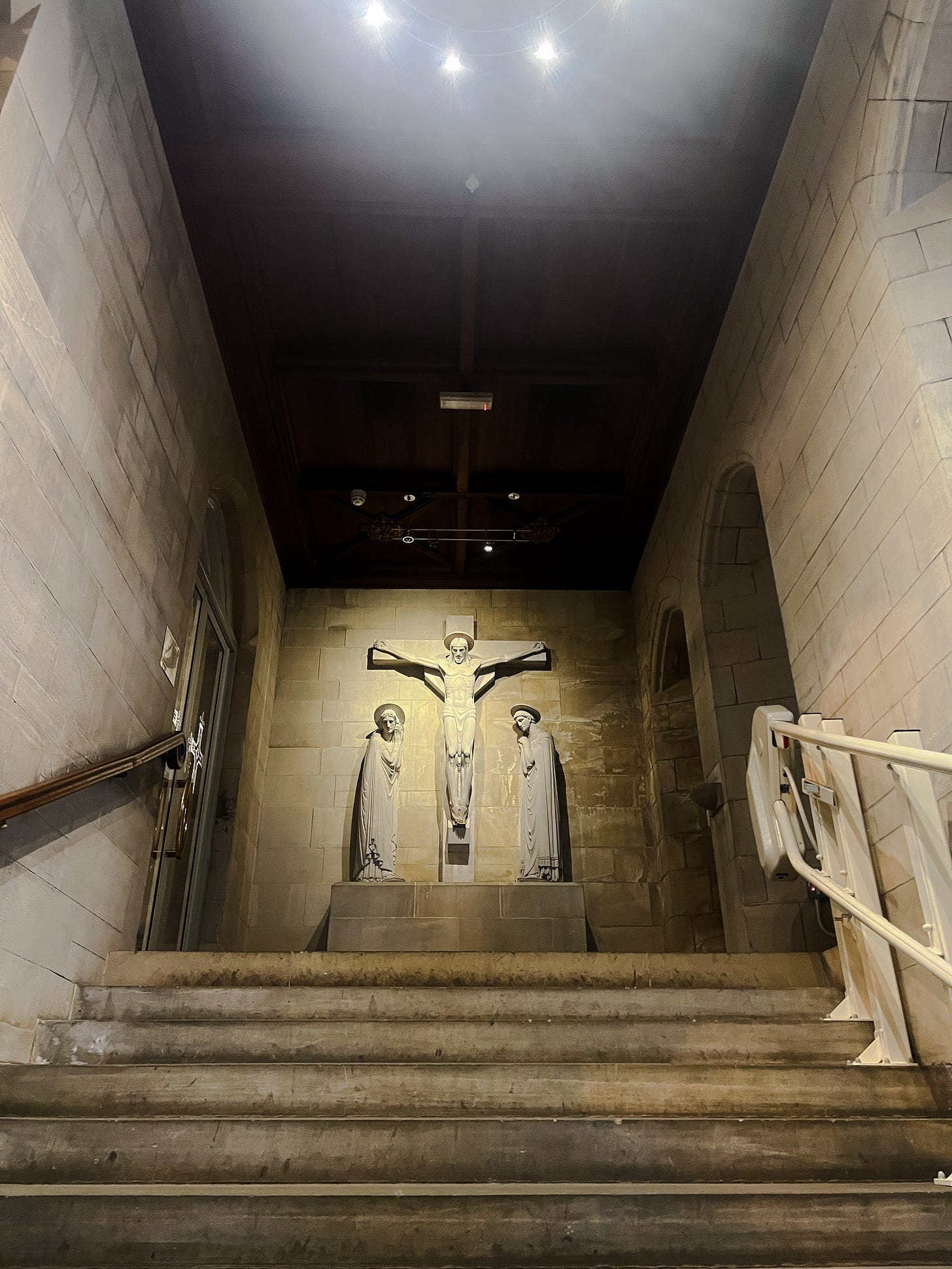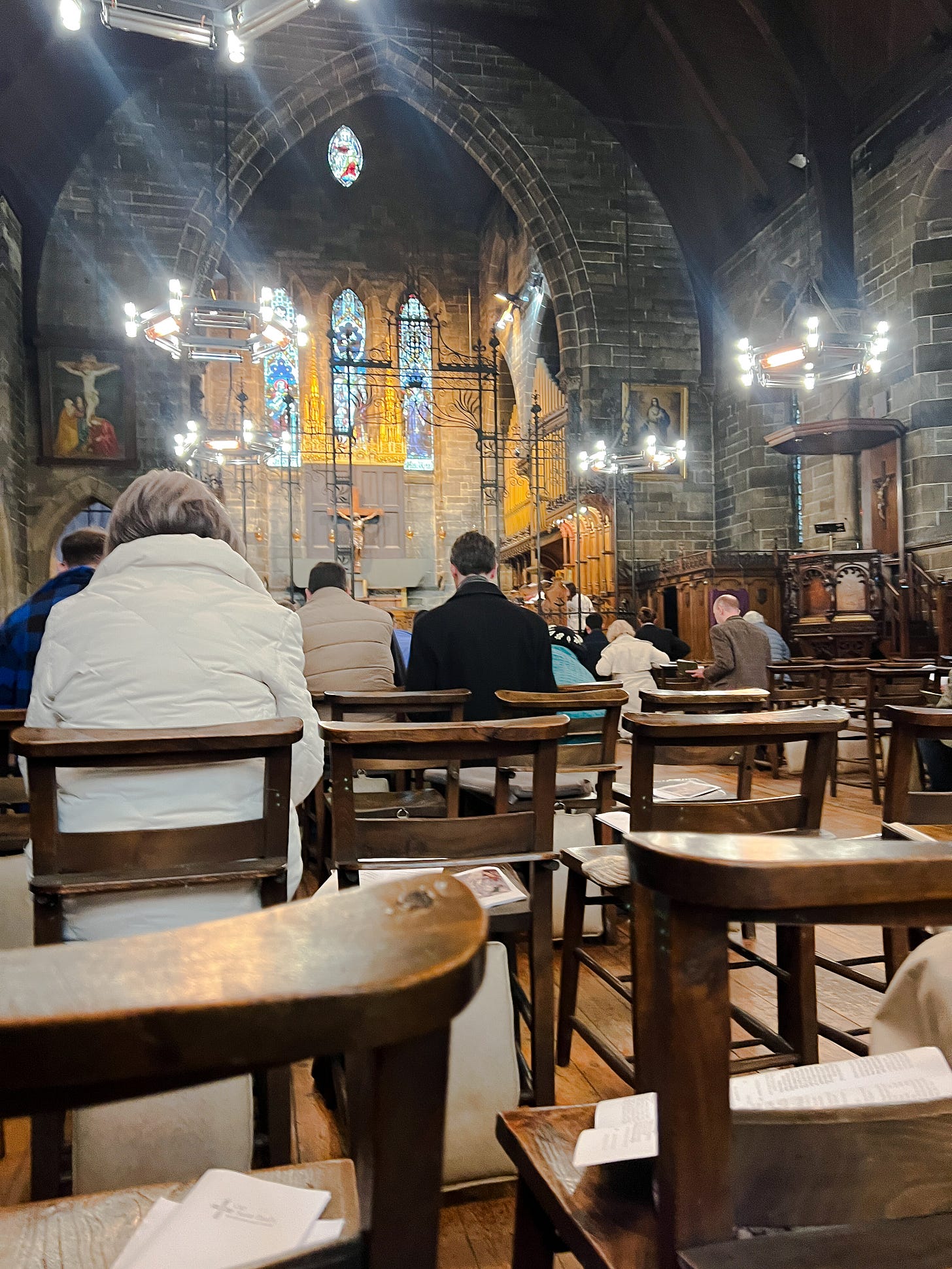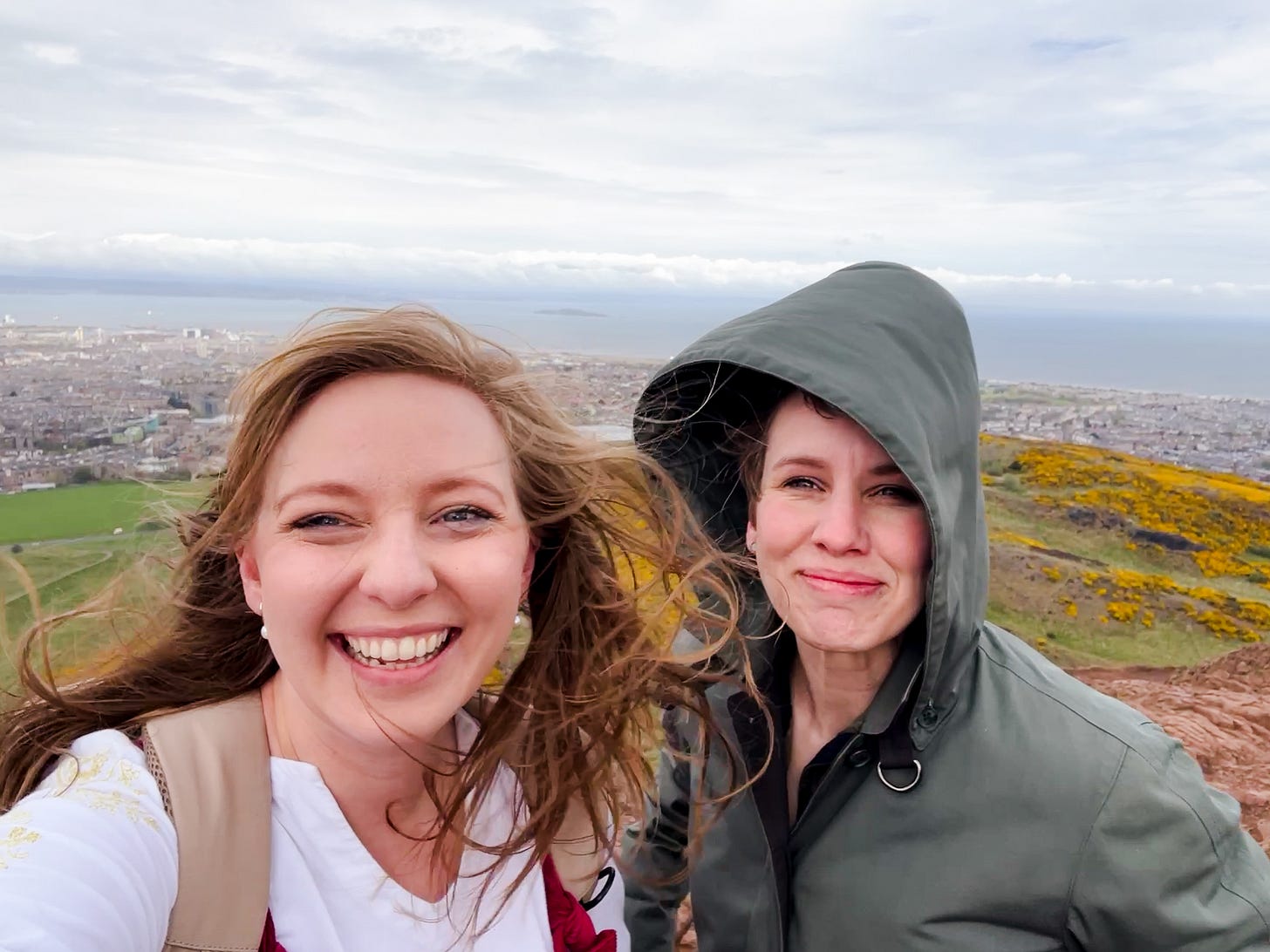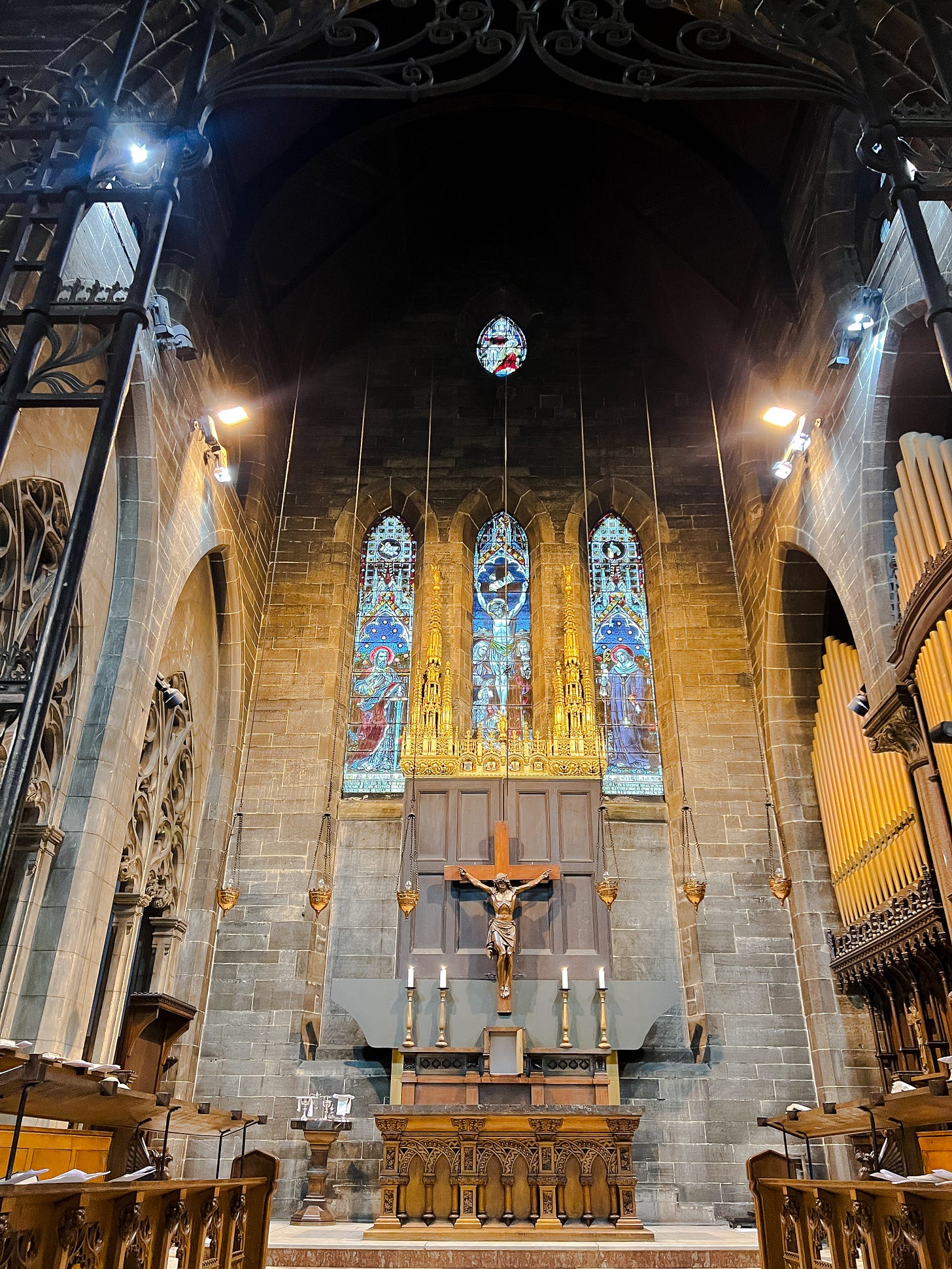How the Eucharist changed me
Thoughts from the Edinburgh Writing Retreat: Part Two
“You know what God’s really been bringing to my attention more lately?”
“What’s that, mom?”
“The importance of taking Communion.”
My jaw might have dropped to the floor if I weren’t beginning to find normalcy in God being… well, God.
Because before my mom even finished her sentence, I knew what she was going to say – the Holy Spirit who talks to me, 5,000 miles across the Atlantic, is the same Spirit who talks to her. Aslan was on the move.
But I need to backtrack a little to 3 separate events which preceded this conversation: hints which confirmed that it was absolutely essential for me to take Communion on Good Friday – right in the middle of my Edinburgh Writing Retreat with Kristen LaValley.
The first hint from God was an essay that sort of tumbled out of me one week back in March. I’d set out to write about how certain academic ideologies are twisting both feminism and Christianity to create a grotesque hybrid – one which dishonours both God and women. But by the end of that essay, the Spirit guided me through a bit of an epiphany as I realised that the “solution” to this particular ideological dumpster fire was offered to me by embracing the very essence of the Eucharist:
This lie that “eating” (i.e. acknowledging the needs of our body) was the first sin? It’s nonsense. Know why? Because God was so concerned about nourishing us with what we needed that He came down and literally offered us Himself.
Read the full essay here.
I did not understand the fullness of what I was writing in that moment. It certainly wasn’t the argument I’d planned on writing. But there it was, in all its simple beauty. He literally offers us Himself to be consumed as an antidote to that first misplaced “consumption.” How had I never made that connection before?
The second hint came a week later as I was picking up my Anglo-Catholic friend from the train station. Completely by chance, we landed on the topic of Transubstantiation during the car journey – an area of theology I’ve never felt particularly compelled to explore.
(Before I carry on here, I just want to pause with a little side-note: I’ve come to learn how divisive a topic this is, and I’m not here to plant my flag in the ground or start a debate. I mean this quite sincerely when I say that I truly don’t know if I believe that the Communion bread and wine becomes the actual Body and Blood of Christ when one receives the Blessed Sacrament – but I also don’t know if I don’t believe it. This essay isn’t really about that. I’m not here to argue the theological pros and cons of Transubstantiation; I’m here to tell a story of what God has been teaching me. And as I’ve come to understand the power and meaning of Communion from Spirit-filled Catholics, I find myself filled with awe and wonder. So I encourage you to approach the rest of this essay with the same attitude as Ted Lasso: be curious rather than judgmental.)
As my friend unpacked what the Eucharist meant to her, I realised that this topic of the Body and Blood had far deeper – and more beautiful – implications than I could ever have known from my Protestant upbringing. It wasn’t simply a question of whether to interpret Christ’s words at the Last Supper literally. The belief that we are nourished with his Body and Blood is a fulfilment in Old Testament traditions of atonement, and moreover, it is an embodiment of one of the greatest mysteries of the Christian faith: how that which is Divine and immaterial entwines with that which is mundane and material. In other words, how God took on flesh, and how my physical body is somehow a temple for His Holy Spirit.
The collision of righteous spirit and broken humanity seems far too impossible, and to think that Christ not only flies in the face of this impossibility but invites me to partake in it? This was beginning to feel like a Sacrament far more beautiful and mysterious than I was taught in Sunday School.
The third hint was a follow-up conversation with my Roman Catholic friend over voice notes. She has very much become the Catholic Tolkien to my Protestant Lewis (if that isn’t too arrogant a comparison to make), and she graciously answers my questions whenever they may arise.
I’ll be honest: I assumed that she would not necessarily match the intensity of my Anglo-Catholic friend when I questioned her on the significance of the Eucharist. I don’t know why I thought this. Perhaps because my Protestant upbringing had only ever presented Communion to me as a sort of revered symbolism bearing no greater power than any other expression of faith. But my assumption was wrong.
“Partaking in the Eucharist is perhaps the single most profound experience of my faith,” she replied in that gentle English accent of hers which always sings the song of quiet truths.
I was stunned. Humbled. And curious.
What was it that I had been missing all these years if these beautiful women were experiencing the Eucharist in a way which vastly outstripped my own encounters of quiet respect verging on (I’m sorry to say) indifference?
Why was it that the act of being fed with Christ’s body had snuck its way into my writing and now my conversations?
My friend continued: “I taught my children about it by explaining that the Eucharist is like Christ’s way of nurturing us – of feeding us with his literal body the way I fed them with my own body as babies.”
As someone who has not yet had the privilege to care for another human in so primal and intimate a way, I cannot overstate how exquisite I found this comparison. Nor can I describe how brazenly it shifted some fundamental building block inside me. It was like I was hearing Christ’s words for the first time:
“This is my body, broken for you.”
Luke 22:19
I came away from this series of events (which culminated in that final conversation with my mom) with an almost insatiable hunger.
Had I any proof for this new perspective on Communion? No. Had I any academic sources or eyewitness accounts? No.
What I had was merely a set of questions:
What if Transubstantiation isn’t true? But what if it is?
It may frustrate you to hear that I didn’t really need to know the answer to this question to know that God was inviting me to experience the Eucharist in a new way – to show me how my hunger could be satisfied more deeply than I ever imagined with the sacrificial banquet that was His perfect Son.
I knew what I had to do. Good Friday was coming, and I would be at the foot of the altar when it did.
For all the Good Friday services taking place across Edinburgh over Passion Week, I could only find one church holding a Communion Service: an Episcopal Church right in the heart of the city where Old Town and New Town converge.
We were 20 minutes late (my best friend, Dusty, and my new friend, Anna, had decided to join me) thanks to Google Maps taking us on a wild goose chase through Waverley Station. The church building, at first glance, blends into the cityscape, but once your eyes fix upon it, the architecture almost sings to you with the ancient hymns soaked into its stones.
Climbing up a flight of stairs, we rushed in, out of breath (or at least I was), to discover a stunning sanctuary, filled with congregants who were all sitting… in utter silence.
The three of us looked at each other, a group of Evangelical women who were a bit lost in such a setting.
Sitting down, I skimmed through the order of service, and to my horror, it became clear that I’d misunderstood the service times on their website. It read as though Communion would take place in the first 90 minutes followed by a worship service in the latter 90 minutes; in fact, it was the exact opposite.
For the first hour or so, we’d be together in contemplative silence – something I doubt any of us had ever done in a corporate worship setting before.
Had I been on my own, I would not have been so mortified. I knew why I was here, and I knew that even if I must wait 3 hours to take Communion, I would wait. But next to me, I could hear my dear friends’ tummies rumbling (Dusty hadn’t even had breakfast), and I did not expect them to linger with me for the sake of a conviction which was mine alone. So I slipped them a silent message, and they quietly made their way out of the sanctuary to find some lunch.
But not before the priest got up to speak. Turns out the contemplative service would be broken up by short sermons tracking Christ’s journey to the cross through the themes of art and silence. He guided us through various historical paintings, focusing on a particular element in each one to draw our attention to Christ’s silence in the face of trial.
Friends, I am writing about this months after the fact, and I’m not sure I could ever do justice to just how profound this moment in time turned out to be. I shared more about it on The Waffler shortly after I got home, and Dusty shared her experience on her free, private podcast, Voice Memos, but needless to say, while we heard the same words come out of the priest’s mouth, the message we received from the Spirit was different.
Dusty came away with a renewed understanding of rest and surrender (something that she explains beautifully on Voice Memos in the context of living with ADHD).
I came away realising that no amount of eloquence or intellect could convince someone of the truth of gospel. The timing for this message was stunning in ways I’m not prepared to share about here, but paid subscribers can hear more in that Waffler episode.
As I listened to this man’s words, my gaze went up to the stained-glass image of Christ on the throne; then my eyes fell to the foot of the altar to see him hanging from the cross. The King made low. The sinless man who stood silent before his accusers. The Son of God made so humbly accessible that he literally offers himself to me. Here. Now. In an old church in Scotland in 2025.
But then that beautiful moment came to end, and my friends left, and I was alone.
For a brief moment after they’d gone, I questioned what I was doing. Had I really heard from God? Was I really meant to stay? Would I regret being here all on my own while everyone else built memories and relationships in which I could not take part?
High School Christina came back again, all fear and anxiety as she questioned her right to belong.
But the Christina of this moment, with an upturned face and a weathered, hopeful heart, stood her ground.
An hour later, the silence ended. More people flooded the sanctuary to attend the Communion Service. They found their pews quietly, but no one sat beside me. A bubble of privacy encircled me, and I watched in curious fascination as men in robes walked wordlessly down the aisle and lay prostrate at the foot of the cross: the physical posture of surrender, honour, worship; the embodiment of leadership humbly submitting itself to the One True King.
My eyes kept trailing up to that image of Christ on the throne and dropping to the second of Christ on the cross.
I was transfixed.
As the priest sung out the stations of the cross as recorded in the Gospel of John, I stared at Jesus’ outstretched arms.
He truly stood in a courtroom once – it is not just a fairytale or myth – and remained silent as they accused him of blasphemy. The one who was the Word from the very beginning of time, the Aslan who was there when the “deep magic was written,” he did not fight to prove his case.
As the collective voice of the choir echoed off the walls, singing “Crucify him!” I wept.
He hung there once, at Calvary – it is not just a fairytale or myth – all flesh and bone, a lamb to the slaughter, as those who had come to him for miracles and healing turned their backs and demanded his execution.
As the bread and wine were blessed and we were each invited up to receive the Blessed Sacrament, my hands shook.
He blessed this bread and wine once – it is not just a fairytale or myth – and he invited us to receive it into ourselves, to respond to his desire for nearness by drawing near in return. So near, in fact, that our bodies become enmeshed with his; our very flesh becomes nourished by his sacrifice. He does not just dignify us in spirit but in blood and bone.
I do not know what I was expecting – to be physically healed of my autoimmune disease or mentally healed of my depression? Maybe. He certainly could have. But that’s not why I’d made my way to a strange, silent church in the middle of Edinburgh on my own while a Writing Retreat was going on in the streets somewhere nearby.
There was a different kind of wholeness that I knew was mine – had been mine for the last 30+ years of my Christian life – yet only now did I see it for what it was.
Somehow, I knew that as my understanding of the Eucharist had shifted so too would my experience of receiving the bread and wine into myself. I fought back sobs as I ate and drank. I walked back to my seat quite glad that no one else save God knew me in that place.
I was not miraculously healed that day, just to be clear. But I walked out of that church and climbed several hundred steps, which I should not have been able to do. I hiked Arthur’s Seat the next day without going into a flare – which I should not have been able to do either. And I wandered the streets of Edinburgh to meet up with my friends feeling, for once, alone but not lonely.
Sometimes, I wonder if we get so stuck in the weeds with “debating” elements of our faith that we forget how much God can meet us where we’re at, even when (especially when) “where we’re at” is saturated in a hunger for Him which far outweighs our desire to “get it right.”
I don’t know if the bread and wine became the physical, molecular flesh and blood of my Saviour as I received it into my body. Truly, I don’t know.
Spiritual “law” implies that it could have. Natural law implies the exact opposite.
And I’m not saying that knowing the truth is unimportant. I’m just saying that there’s a deeper truth at hand which lies beneath the intellectual question. The embodied truth which seeps to the core of our sanctified flesh is this: the Eucharist is proof positive that Christ is nearer than our next breath.
Read that again. Christ is nearer than our next breath.
Do you realise what this means?
After receiving Communion for what felt like the first time, I stood in my pew, mildly dazed, contemplating an entirely different meaning to Christ’s words when he said “Daughter, your faith has made you well.”1
As I wandered back to find my friends, all of whom had travelled here from different parts of the world to commune over a shared “not-knowing-it-all-ness,” I thought…
Perhaps this is all we need for wholeness when theology confuses us and the right answer eludes us.
Perhaps we can find rest in humility, silencing our pomp and circumstance in exchange for awe and wonder.
Perhaps God’s very desire to draw near to us is enough of a mystery that we could spend our entire lives exploring its depths and never find an end to how Someone so just and good and true could also be filled with such love and mercy.
Perhaps, in the Eucharist, we can allow spirit and flesh to receive as one the very essence of the gospel: Child, your faith has made you well.
All my love,
P.S. If you enjoy my writing and would like to learn more about writing as an act of creativity and worship, join The Writer’s List here.
Matthew 9:22









I have no idea what I believe or don’t believe about it but I know I am fascinated by it, this overlap between Heaven and earth. There’s this beautiful line in Letters to Malcom by C. S. Lewis that I keep coming back to: “The command, after all, was Take, eat: not Take, understand.”
This was beautiful. I was raised Catholic, then Baptist, and then married my husband who is a lifelong LCMS Lutheran (on the conservative side - there is a spectrum), and I have found such peace in the way they describe Communion. They allow for the mystery. Do we know HOW it becomes Jesus’s body and blood? No, we don’t. But we acknowledge that His very own words say that it DOES, and we believe Him. The Lutheran phrase is “In, With, and Under” - meaning we acknowledge that Christ IS present, as He says He is, but that we (as humans in this pre-eternal life existence) do not (and maybe cannot) understand how that is true.
My husband always says that we speak where the Bible speaks, and we are silent where the Bible is silent. After years of being in churches that drew their own conclusions on the silent parts, I have found a great peace in being encouraged to admit that we do not and cannot know all things in this life. God does, and that is enough. 💛